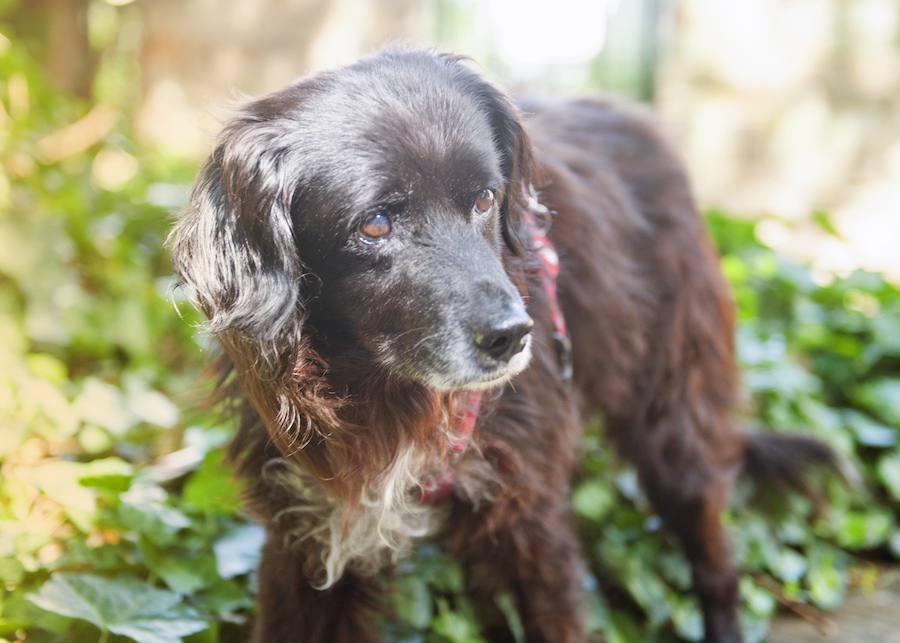Dog food for seniors
As dogs get older, their eating habits change – and so does the food they need.
Most dog foods are designed with a dog’s life stage in mind, so it’s a good idea to think about changing their food as they get older. This ensures they get all the essential nutrients they need to stay happy and healthy. At tails.com we know every dog is different, so keep reading to find out what it means to have a senior dog and which food is best for them.
Why senior dogs are simply fantastic
When humans consider getting a new dog, puppies and young adults are often snapped up first. But all over the country, shelters are full of older dogs looking for their new forever home. Senior dogs can be difficult to rehome, but spend a few minutes with an older pup, and you’ll soon realise how much joy they can bring to your life.
By adopting a golden oldie, you know you’ll be giving them the best retirement. You’re giving them a chance to live out their later years in happiness, with a family that loves them. And when you open your heart and home, you get bags of love and appreciation in return. Because, guess what? Older dogs are often the most loving and affectionate pooches going. They’ve lived life in the fast lane already. Their idea of a great time is snuggling up and relaxing by your side.
Older dogs have often been around a family before, so they understand what’s expected of them. They’re more likely to be housetrained, they’ll probably be less demanding than a puppy or younger dog, and they often already know not to chew up the carpet or your favourite pair of shoes (or not!).
And since they don’t have the same energy as a puppy, they don’t need as much exercise. Which means senior dogs are the perfect companion for relaxing strolls and curling up on the sofa. Older dogs really are overlooked gems. They give us instant companionship, and they’re ready with open paws to love and be loved.
Why your older dog needs senior dog food
Our dogs’ nutritional needs change as they age, so to keep them happy and healthy we need to make sure they’re eating the right food. Senior dogs aren’t always the bouncy fur balls they once were – life is a bit more slow-paced! So, their metabolism will usually slow down, and for some older dogs, napping can quickly become a favourite pastime (same here!).
Without lots of exercise and playtime, older dogs often put on a little bit of weight. And even if your pooch still keeps up with their long walks, their metabolism naturally slows down. This means they simply don’t need as many calories to keep them going.
Depending on breed, your dog might actually go the opposite way and lose weight. Quite often, joints become stiffer, and your dog might develop health conditions like arthritis or kidney problems. But the good news is – the best senior dog food keeps all this in mind, and tailored dog food is a great option to give them the nutrition they need. The ingredients and nutrients included should adapt as they age – so your older dog always has a spring in their step.
Tailored senior dog food includes beneficial nutrients like glucosamine and chondroitin to support healthy joints. The diet is usually higher in fibre to support the digestive system and easy to digest proteins, as well as including the right balance of minerals and vitamins like selenium, iron and vitamin B. It should also include the right balance of fat, protein and carbohydrates to maintain your dog’s ideal weight, all whilst taking into account your dog’s slower metabolism and lower energy levels.
When should dogs switch to senior dog food?
Switching to senior dog food all depends on their age and breed. Usually, vets will consider around 10+ years to be senior, but every dog is different. For example, a chihuahua or toy poodle isn’t usually considered senior until they’re about 10-12 years old. Large breeds like Newfoundlands or Labradors reach their senior years at about 8 years old.
You can use your dog’s breed to guide you on when to make the switch to senior dog food, and there are a couple of signs to look out for to know when it’s time. Just bear in mind these signs might also be caused by other factors like a change in season, routine or a health condition. It’s also important to remember that making the switch too early or too late might affect your dog’s health, so have a chat with your vet or vet nurse to get some advice if you’re not sure.
Slowing down – This can be perfectly normal as dogs get a bit older, and it happens to us humans too! Joints can get a bit still, making getting around a little bit harder, but if your senior dog is experiencing lethargy or weakness, it’s a good idea to get them booked in with your vet for a check up. They might have a health condition, or they might need some different nutrients in their food to give them a bit of extra support, but your vet will be the best person to ask.
Dull, flaky coat – The ageing process can dull a dog’s coat over time. Senior dog foods often include omega fatty acids and other coat-friendly nutrients that will bring that silky shine back to your pooch’s fur. If you’re still concerned or have noticed other changes, like their coat colour turning a different shade (and we don’t mean grey!), have a chat with your vet or vet nurse for some advice.
Piling on the weight – Routine stayed the same but they’re looking a bit chunkier than before? It might be that your dog’s current food is too high in calories for their lower energy needs. A senior dog food will reduce the levels of calories according to their change in metabolism and activity levels. Weight gain might also be a sign of a health condition, so book in a check up if you’re not sure.
Tailored food, just for them
A lot of the time, when dog owners switch from adult to senior dog food, it happens quite abruptly. They might forget to switch or don’t realise they should be feeding something different. They might then end up making a big jump to a food that isn’t the best option for their dog.
Here at tails.com, we do things a little differently. We’ll tailor your dog’s dry food to their specific needs. We give you a senior dog food that’s designed for your dog’s individual life stage. Their unique recipe is based on everything you tell us about your dog. It takes into account their breed, age, activity levels, flavour preferences and more. And on top of that, your dog’s unique recipe develops as they do.
All you need to do is update your dog’s profile as their needs change, and we’ll make sure their recipe is made with the right blend of ingredients for their stage of life. It really is that simple! So you’ll always know your dog’s diet is spot on for their needs.





















